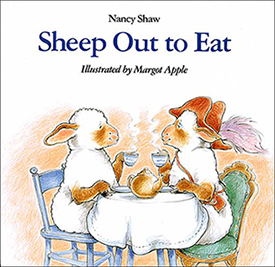My son Nathan has a good memory. Lately, he has delighted to display this ability by spouting a monologue from Hamlet at unsuspecting members of our family. He recently decided to put this skill to use to memorize Scripture. There was a prize being offered for students at church for Bible memory. Nate chose Psalm 23. I know I should be encouraged, but it seems like everyone has Psalm 23 already memorized.
Why is this psalm so popular? Because according to Psalm 23, God is our shepherd. To illustrate what it means for us to be divinely shepherded, the psalmist uses language from the world of shepherding in the first four verses of Psalm 23: green pastures and still waters, paths and valleys, a rod and a staff.
Psalm 23:1 A Psalm of David.
The LORD is my shepherd; I shall not want.
2 He makes me lie down in green pastures.
He leads me beside still waters.
3 He restores my soul.
He leads me in paths of righteousness for his name’s sake.
4 Even though I walk through the valley of the shadow of death,
I will fear no evil, for you are with me;
your rod and your staff, they comfort me.
Many people speak about Psalm 23 as the shepherding psalm, as if that were the theme of all six verses. But I’m not so sure. Does the shepherd analogy continue into verse 5?
5 You prepare a table before me in the presence of my enemies;
you anoint my head with oil; my cup overflows.
6 Surely goodness and mercy shall follow me all the days of my life,
and I shall dwell in the house of the LORD forever.
Can you imagine sheep eating a table, surrounded by wolves, drinking from a cup? Sheep out to eat?
While the picture is cute in a children’s book (by the same author/artist team of Sheep in a Jeep…on a hill that’s steep), it doesn’t really work in Psalm 23. I think the sheep analogy ends after verse four.
But the new metaphor the psalm shifts to is just as powerful as the previous one. God the divine shepherd becomes God the divine host (of people, not sheep).
God is now a friend hosting us for a meal, with abundant food and drink. God is inviting us to not just stay for a few days, but to move into his house permanently. (Ben Franklin said fish and visitors both stink after three days. Fortunately, God does not share Franklin’s attitude toward hospitality.)
While the psalmist is abiding in YHWH’s house, not only does he receive abundant provision, but goodness (tov) and mercy (hesed) pursue him while he’s there. The Hebrew word radap, usually translated as “follow” is an aggressive verb, used in contexts of chasing and hunting (Deut. 19:6; Judg. 4:16; 1 Sam. 23:28). I love the oxymoronic image of God’s goodness and mercy hunting me down.
The reality is that we don’t always welcome God’s shepherding, hosting and providing. But that’s OK. Even when I’m doing all in my power to avoid God’s grace, mercy, love and forgiveness, it’s comforting to know that he continues to aggressively pursue me. As I struggled with reflux, voice problems and sleeplessness this past fall, God was relentless in his pursuit of me.
What does it mean for God’s goodness and mercy to hunt us down?
If you’re interested here are my previous posts on Psalm 23: Part 1 and Part 2.
So, do you let your pets eat at the table with you?

